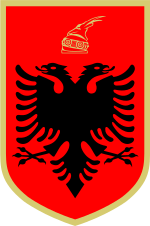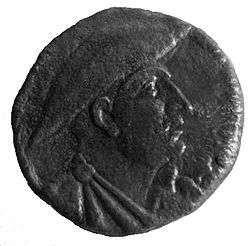Ardiaei
The Ardiaei (Ancient Greek: Ἀρδιαῖοι or Οὐαρδαῖοι, Ouardaioi; Albanian: Ardianët; Latin: Vardiaei, Vardaei)[1] were an Illyrian tribe, residing on territory of present-day Albania, Kosovo, Montenegro, and Bosnia and Herzegovina between Adriatic coast on the south, Konjic on the north, along the Neretva river and its right bank on the west, extending to Lake Shkodra to the southeast.[2][3] From the 3rd century BC to 168 BC Scodra was the Ardiaean capital.[4] Polybius (203 BC–120 BC) writes that they were subdued[5] by the Romans at events that occurred at 229 BC. Appian (95–165) writes that they were destroyed[6] by the Autariatae and that in contrast to the Autariatae had maritime power. In the Epitome of Livy they are said to have been subdued[7] by the consul Fulvius Flaccus.
Name
The tribal name Ardiaei may be related to the Latin ardea meaning "heron", a symbol of animal totemism.[8]
Location
Accounts in ancient sources create much confusion about the location of the Ardiaean original homeland.[9] They were located in the area of southern Illyria, somewhere in present-day Montenegro,[10] most likely around the gulf of Rhizon, although Strabo places them in the right bank of the Neretva.[11] Their initial inland residence was located along the Naro River up to the Konjic region,[2] in present-day Bosnia and Herzegovina.
The name of the town Čapljina is another feature suggesting that the original homeland of Ardiaei might indeed have been the Neretva valley region. Specifically, there is a town in Bosnia and Herzegovina situated in the wider Neretva valley region (the original homeland of ancient Illyrian people of Ardiaei), called Čapljina, and its name derives from čaplja, which in modern Bosnian language means 'heron'. The Latin word for heron is ardea, a word that bears striking similarity with the name of Ardiaei, and should not be excluded altogether as its potential cognate.
This hypothesis opens up many possibilities for the interpretation of the original homeland of the Ardiaei and the etymology of their name. For example, heron might have had totemic pagan value among the Illyrians inhabiting that region, due to its presence in this area, and it is not implausible to conclude that one of those Illyrian peoples named itself after a heron, the Ardiaei. The Latin word ardea might be a Latin translation of some original Illyrian word for 'heron' that Romans found when they settled in this area, or the 'ardea' itself could have been an Illyrian word taken by Romans, who might have slightly altered it and integrated it into their language, Latin. Indeed, the word Ardiaei is found in ancient Greek sources predating the arrival of Romans and their language to the Illyrian lands. It is also possible that ancient Illyrians or Romans named this place the place of heron(s), and the Slavic settlers, who settled in the former Illyrian lands around 6th century A.D. translated the name of this place into their language(s), which in turn gave Čapljina, "the place of heron(s)".[12]
History
Due to widespread piracy perpetrated in the Adriatic by the Ardiaei and other Illyrian tribes, the Romans campaigned against them in the events of the Illyrian Wars. They were viewed as heavy drinkers in comparison, by the Greeks.[13]
The Ardiaei were enemies[14] of the Autariatae for a long time over salt source.[15]
The Ardiaei had briefly attained military might, during 230 B.C. under the reign of king Agron (an Ardiaean by tribal origin). His widow, Queen Teuta attempted to gain a foothold in the Adriatic but failed due to Roman intervention. Historic accounts hold that King Agron was hired[16] by king Demetrius of Macedonia repel the invasion of Macedonia by the invading Aetolians. The Ardiaei had 20 decuriae.
The ancient geographer, Strabo, lists the Ardiaei as one of the three strongest Illyrian peoples – the other two being the Autariatae and the Dardani. Strabo writes;[17]
“Because they pestered the sea through their piratical bands, the Romans pushed them back from it into the interior and forced them to till the soil. But the country is rough and poor and not suited to a farming population, and therefore the tribe has been utterly ruined and in fact has almost been obliterated. And this is what befell the rest of the peoples in that part of the world; for those who were most powerful in earlier times were utterly humbled or were obliterated, as, for example, among the Galatae the Boii and the Scordistae, and among the Illyrians the Autariatae, Ardiaei, and Dardanii, and among the Thracians the Triballi; that is, they were reduced in warfare by one another at first and then later by the Macedonians and the Romans.”
King Agron, son of Pleuratus who belonged to the ruling house of the Ardiaei, disposed of the most powerful force, both by land and sea, of any of the kings which had reigned in Illyria before him.[18]
Ardiaean dynasty
The following is a reconstruction of the Ardiaean dynasty by N. G. L. Hammond (1966):[19]
- Pleuratus I (fl. c. 340 BC), fought against Philip II probably in 344/343 BC
- (?) (fl. c. 310 BC)
- Pleuratus II (fl. c. 280 BC)
- Agron (fl. c. 250 BC, died c. 230 BC), husband of Teuta
- Pinnes (fl. c. 220 BC)
- Scerdilaidas (fl. c. 250 BC)
- Pleuratus III (fl. c. 220 BC)
- Agron (fl. c. 250 BC, died c. 230 BC), husband of Teuta
- Pleuratus II (fl. c. 280 BC)
- (?) (fl. c. 310 BC)
The branch of Scerdilaidas is generally considered a Labeatan dynasty, that emerged after the fall of Agron and Teuta.[20][21] The following list reports the members of the Ardiaean dynasty documented as such in ancient sources:[20][21]
- Agron (– 231 BC), husband of Teuta
- Teuta regent for Pinnes (231 – 228)
- Demetrius regent for Pinnes (228 – 220)
- Pinnes (220 – after 217)
See also
References
Citations
- Wilkes 1992, p. 216: "The Ardiaei, or Vardaei as they were known to the Romans, 'once the ravagers of Italy' and now reduced to a mere."
- Šašel Kos 2005, p. 320: "The Ardiaei were certainly also settled in the hinterland, along the Naro River at least as far as the Konjic region..."
- Wilkes 1992, p. 188: "probably the result of pressure from new Illyrian groups, including the Ardiaei and Delmatae, moving towards the Adriatic..."
- Vickers 1999, p. 2.
- Plb. 2.11, "The Romans, taking the Epidamnians under their protection, advanced into the interior of Illyricum, subduing the Ardiaei as they went."
- App. Ill. 1, "In like manner the Ardiæi, who were distinguished for their maritime power, were finally destroyed by the Autarienses, whose land forces were stronger, but whom they had often defeated."
- vardaei-geo
- Elsie 2015, p. 2: "Their name may be related to the heron (Lat. ardea) as a totem symbol."
- Dzino 2010, p. 46.
- Šašel Kos 2005, p. 170: "...who located the Ardiaei in the southern Illyrian area in present-day Montenegro..."
- Dzino 2005, p. 58: in the vicinity of the Rhizonic gulf... Strabo locates them on the right bank of Neretva."
- Adzanela (Axhanela) Ardian, Illyrian Bosnia and Herzegovina-an overview of a cultural legacy, 2004, Centre for Balkan Studies, Online Balkan Centre : https://www.academia.edu/2490281/Illyrian_Bosnia_and_Herzegovina-an_Overview_of_a_Cultural_Legacy_Ancient_Illyrians_of_Bosnia_and_Herzegovina
- Wilkes 1992, p. 221: "To the Greek world the Illyrians appeared heavy drinkers, from the drinking bouts of the Ardiaei from which intoxicated men were conveyed home by their women, who had also participated, to the overindulgence of their kings ..."
- Wilkes 1992, p. 139: "... describes a long-running feud between the Autariatae and the Ardiaei over the possession of a salt-source near their common border ..."
- Wilkes 1992, p. 223: "The salt source that was a cause of conflict between the Illyrian Ardiaei and Autariatae may be that at Orahovica in the upper Neretva valley near Konjic."
- The Cambridge Ancient History, Volume 7, Part 1, by Frank William Walbank, 1984, ISBN 0-521-23445-X, page 452
- Strab. 7.5
- Wilkes 1992, pp. 156–157: "Agron, son of Pleuratus belonged to the ruling house of the Ardiaei. 'Agron was king of that part of Illyrian which borders Adriatic sea, over which Pyrrhus and his successors had held sway. In turn he captured part of Epirus and also Corcyra, Epidamnus and Pharos in succession, and established garrisons in them'(Appian Illyrike 7). The new power disposed of the most powerful force, both by land and sea, of any of the kings who had reigned in Illyria before him', we are informed by Polybius (2.2)"
- Hammond 1966, pp. 243–246.
- Dzino 2010, p. xvii.
- Dzino 2014, p. 57.
Bibliography
- Dzino, Danijel (2005). "Late Republican Illyrian Policy of Rome 167-60 BC: the Bifocal Approach". In C. Deroux (ed.). Studies in Latin Literature and Roman History. 12. Latomus. pp. 48–73. ISBN 9782870312285.
- Dzino, Danijel (2010). Illyricum in Roman Politics, 229 BC–AD 68. Cambridge University Press. ISBN 978-0-521-19419-8.CS1 maint: ref=harv (link)
- Dzino, Danijel (2014). "'Illyrians' in ancient ethnographic discourse". Dialogues d'histoire ancienne. 40 (2): 45–65.CS1 maint: ref=harv (link)
- Elsie, Robert (2015). "The Early History of Albania" (PDF). Keeping an Eye on the Albanians: Selected Writings in the Field of Albanian Studies. Albanian Studies. 16. ISBN 978-1-5141-5726-8.CS1 maint: ref=harv (link)
- Ferone, Claudio (2004). "Appiano, "Illyr." 3 e la pirateria illirica nel IV sec.A.C." [Appian, "Illyr." 3 and the Illyrian piracy in the 4th century BC]. Hermes (in Italian). Franz Steiner Verlag. 132: 326–337. JSTOR 4477612.
- Hammond, Nicholas Geoffrey Lemprière (1966). "The Kingdoms in Illyria circa 400-167 B.C.". The Annual of the British School at Athens. British School at Athens. 61: 239–253. JSTOR 30103175.CS1 maint: ref=harv (link)
- Hammond, N. G. L. (1982). "Illyris, Epirus and Macedonia". In John Boardman; N. G. L. Hammond (eds.). The Cambridge Ancient History: The Expansion of the Greek World, Eighth to Sixth Centuries B.C. III (part 3) (2 ed.). Cambridge University Press. ISBN 0521234476.CS1 maint: ref=harv (link)
- Hammond, N. G. L. (1994). "Illyrians and North-west Greeks". The Cambridge Ancient History Volume 6: The Fourth Century BC. Cambridge University Press.CS1 maint: ref=harv (link)
- Katičić, Radoslav (1976). Ancient Languages of the Balkans. Mouton. p. 158.CS1 maint: ref=harv (link)
- Šašel Kos, Marjeta (2005). Appian and Illyricum. Narodni Muzej Slovenije. ISBN 978-961-6169-36-3.
- Stipčević, Aleksandar (1974). The Illyrians: history and culture (1977 ed.). Noyes Press. ISBN 978-0815550525.CS1 maint: ref=harv (link)
- Vickers, Miranda (1999). The Albanians: a modern history. New York: I. B. Tauris. ISBN 978-1-86064-541-9.CS1 maint: ref=harv (link)
- Wilkes, John J. (1992). The Illyrians. Oxford, United Kingdom: Blackwell Publishing. ISBN 0-631-19807-5.CS1 maint: ref=harv (link)
Further reading
- Severyn Bernolak; Vladoila Kolarić (1912). Iz povjesti Bosne i Hercegovine: Ardijejci. vlast. nakl.

